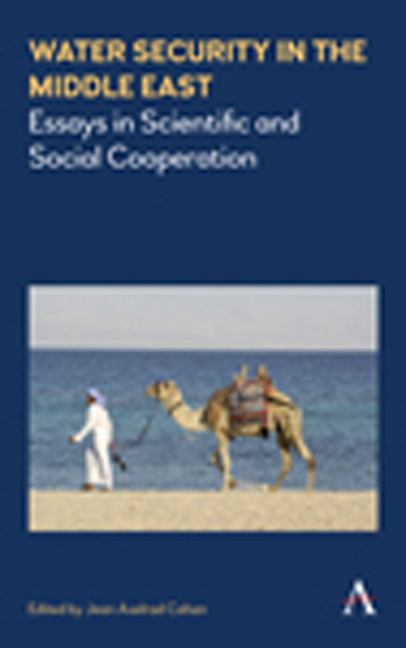Book contents
- Frontmatter
- Contents
- List of Illustrations
- Acknowledgments
- Foreword
- Introduction Water Security in the Middle East: A Role for the Social Sciences and Humanities
- Chapter 1 Cooperation Rules: Insights on Water and Conflict from International Relations
- Chapter 2 Water Security in Transboundary Systems: Cooperation in Intractable Conflicts and the Nile System
- Chapter 3 Water-Demand Management in the Arab Gulf States: Implications for Political Stability
- Chapter 4 A Watershed-Based Approach to Mitigating Transboundary Wastewater Conflicts between Israel and the Palestinian Authority: The Besor-Hebron-Be'er Sheva Watershed
- Chapter 5 The Evolution of Israeli Water Management: The Elusive Search for Environmental Security
- Chapter 6 Adapting to Climatic Variability along International River Basins in the Middle East
- Chapter 7 Water and Politics in the Tigris-Euphrates Basin: Hope for Negative Learning?
- Chapter 8 The Political and Cultural Dimensions of Water Diplomacy in the Middle East
- Notes on Contributors
- Index
Chapter 6 - Adapting to Climatic Variability along International River Basins in the Middle East
- Frontmatter
- Contents
- List of Illustrations
- Acknowledgments
- Foreword
- Introduction Water Security in the Middle East: A Role for the Social Sciences and Humanities
- Chapter 1 Cooperation Rules: Insights on Water and Conflict from International Relations
- Chapter 2 Water Security in Transboundary Systems: Cooperation in Intractable Conflicts and the Nile System
- Chapter 3 Water-Demand Management in the Arab Gulf States: Implications for Political Stability
- Chapter 4 A Watershed-Based Approach to Mitigating Transboundary Wastewater Conflicts between Israel and the Palestinian Authority: The Besor-Hebron-Be'er Sheva Watershed
- Chapter 5 The Evolution of Israeli Water Management: The Elusive Search for Environmental Security
- Chapter 6 Adapting to Climatic Variability along International River Basins in the Middle East
- Chapter 7 Water and Politics in the Tigris-Euphrates Basin: Hope for Negative Learning?
- Chapter 8 The Political and Cultural Dimensions of Water Diplomacy in the Middle East
- Notes on Contributors
- Index
Summary
“Climate Change will require a more severe adjustment of water resources management in MENA [Middle East and North Africa] than any other region.”
— World Bank (2007a, 4)Various climate-change models are predicting an increase in temperature, a decrease in precipitation and an increase in the evaporation rate for the riparian states sharing international rivers in the Middle East, such as the Jordan, Euphrates and Tigris Rivers. Experts also anticipate an increase in weather extremes, such as floods and droughts, and a decrease in the overall freshwater supplies throughout the Middle East (Evans 2009; Alpert et al. 2008; World Bank 2007b; Verner 2012; IPCC 2014). In this region of the world that is already plagued by severe freshwater shortages, any decrease or variability in supplies is likely to intensify an already stressful crisis and contribute to significant direct and indirect losses (Verner 2012). It can also exacerbate interstate and intrastate conflicts and compromise states’ ability to comply with existing treaties or protocols governing the region's international rivers.
To minimize the social, economic and political losses from the anticipated changes produced by climate variability, experts have searched for means by which society, states and the international community can build adaptive capacity to minimize their vulnerability (Adger, Arnell and Tompkins 2005; Koch, Vogel and Patel 2007). One area that will require improved adaptive capacity but that has been largely neglected by the existing literature is interstate institutions, in particular river basin commissions established to manage international rivers. Drawing on neoliberal institutionalism, an international relations theory about the role of institutions in facilitating cooperation, this chapter explores the role and resilience of Middle Eastern river basin commissions in managing the transition to the anticipated decrease in freshwater availability and the likelihood of increased tension between riparian states. Through an analysis of the design and capabilities vested in the region's existing commissions, the chapter proposes that they in fact lack adaptive capacity to manage uncertainties and address interstate disputes. To minimize the potential threat of increased regional tensions or conflict, the chapter argues that existing commissions need to be redesigned and empowered with additional capabilities.
Data for this chapter come from field research in Jordan, Israel, Turkey, Syria and Palestine in 2000, 2001 and 2012. During field research, regional newspapers were searched along with interviews with government officials, representatives of the international donor community, nongovernmental organizations and university scholars.
- Type
- Chapter
- Information
- Water Security in the Middle EastEssays in Scientific and Social Cooperation, pp. 145 - 166Publisher: Anthem PressPrint publication year: 2017

